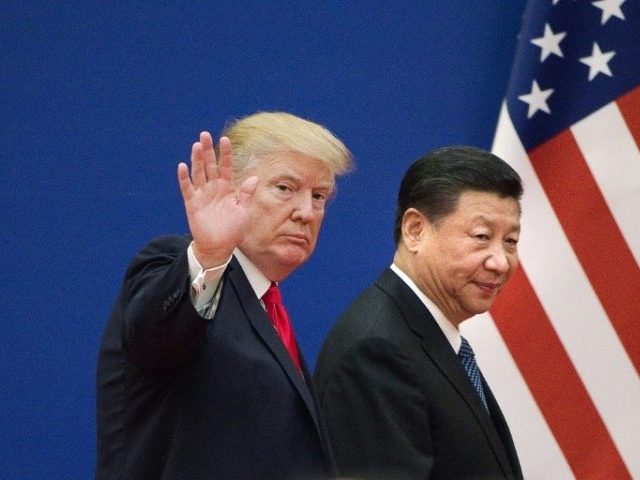President Donald Trump continues criticizing China for failing to stop the spread of the coronavirus to the world, but behind the scenes, the administration continues a complex multi-faceted messaging battle.
In response to a question from Breitbart News last week, Trump said his administration was pursuing “serious investigations” on China’s handling of the virus.
“There are a lot of ways you can hold them accountable. We’re doing very serious investigations, as you probably know,” he said. “And we are not happy with China.”
Anonymous senior White House officials followed by telling the Washington Post they were exploring ideas for punishing China, including sharp retaliatory economic measures.
The sharpened rhetoric continued, as an anonymous senior Trump administration official told Reuters that the informal “truce” between Trump and Chinese dictator Xi Jinping when they last spoke in March was now over. The “truce” appeared to be the president’s decision to pause his description of the coronavirus as the “Chinese virus,” although he repeatedly noted that “it came from China.”
The White House did not respond on the record to requests from Breitbart News for clarification of the anonymous comments.
On Sunday, the president further escalated his criticism of the Chinese government in a town hall with Fox News.
He accused the Chinese of making a “horrible mistake” with the spread of the virus, called China “embarrassed” by the problem that it “didn’t want to admit,” and even suggested China was complicit in letting the virus spread to the rest of the world.
He also suggested more punishing tariffs on goods coming from China, calling them the “ultimate weapon.”
The president also accused China of wanting to see him lose his reelection to former Vice President Joe Biden.
“China will do anything they can to have me lose this race,” he said in an interview with Reuters.
But while the administration is ramping up the rhetoric against China, it is also watching to make sure the government maintains the first phase trade deal signed in January.
Treasury Secretary Stephen Mnuchin warned China on Monday of “significant consequences” if it failed to live up to its end of the deal.
“I’m expecting them to meet their obligations,” Mnuchin said in a Fox Business interview. “I have every reason to expect that they honor this agreement and if they don’t, there would be very significant consequences in the relationship and in the global economy as to how people would do business with them.”
The Wall Street Journal on Tuesday interpreted remarks from Deputy National Security Adviser Matt Pottinger that the Trump administration was softening its position on China.
“The U.S. isn’t looking at punitive measures here,” Pottinger said in a discussion about China with the University of Virginia’s Miller Center. “What President Trump is looking at doing is continuing the policy that he ran on, the policy that he’s implemented, which is to have a reciprocal and fair relationship with China.”
Pottinger, one of the administration’s prominent China hawks, used the forum to tackle China ideologically, extolling the virtues of China’s populist heroes who were persecuted by the communist government for telling the truth about the coronavirus.
Pottinger also explained that China’s economic growth since its admission in the World Trade Organization was used to move toward authoritarianism rather than democratization.
He noted that Trump was ultimately the negotiator of any economic changes with China, but praised the president’s success at using tariffs to bring China to the first phase of a trade deal.
“We have a deal in initial phase one trade deal that was signed at the beginning of this year,” he said. “President Trump has every expectation and desire to see China fulfill it’s end of the bargain.”
Pottinger also referred to Trump’s remarks on Sunday, noting that the president will keep existing tariffs on China.
“He’s made clear that he’s not going to remove tariffs,” he said. “The tariffs are what allowed us to actually achieve that deal in the first place, and he’s going to be watching very carefully to make sure that China holds up its end of the bargain.
Secretary of State Mike Pompeo has also significantly escalated his rhetoric on China in a series of interviews. Pompeo’s repeated description of the coronavirus as the “Wuhan virus” earned a warning from China’s state media for “playing with fire” while describing him as the “enemy of world peace.”
But even the escalating rhetorical war appears to have its limits.
Vice President Mike Pence hesitated in an interview with talk radio host Hugh Hewitt, who asked him if the United States was in “Cold War 2.0” with China.
Pence said the administration will continue fighting to reset the relationship with China but also cited Trump’s “good working relationship with President Xi.”
During the town hall with Fox News, Trump also hesitated to preview any specific economic actions against China, citing the “very complicated game” at work.
“I don’t like to tell you,” Trump said when asked whether he was considering new tariffs. “Because, you know, we’re all playing a very complicated game of chess or poker. Name whatever you want to name it, but it’s not checkers — that, I can tell you.”

COMMENTS
Please let us know if you're having issues with commenting.